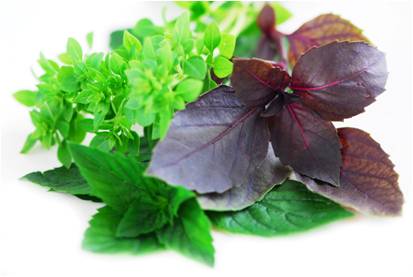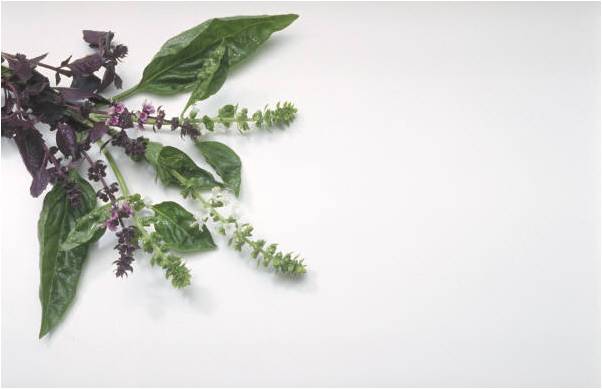Health Benefits of Basil
We know that basil adds great flavor to our meals, but the health benefits of basil also are well documented. Basil, a member of the mint family, has been used as a medicinal plant for many years in different parts of the world (see Holy Basil and Holy Basil Extract), as its oils and extracts have antioxidant and antibacterial properties. More on that later.
A standard portion of basil is considered 2 tsp, or about 3 grams. In this case, 60% of the daily recommended allowance is covered in this portion of basil. A chart, provide by the World’s Healthiest Foods website, a George Mateljan Foundation, a not-for-profit foundation which seeks to make the public aware of healthier foods, provided this chart on benefits of basil for these common health and nutritional supplements:
| Nutrient | Amount | US Recom Allow % |
World’s Healthiest Foods Rating |
|---|---|---|---|
| Vitamin K | 48.01 mcg | 60.0% | Excellent |
| Iron | 1.28 mg | 7.1% | Very Good |
| Calcium | 63.4 mg | 6.3% | Very Good |
| Vitamin A | 281.24 IU | 5.6% | Very Good |
| Dietary Fiber | 1.2 g | 4.8% | Good |
| Manganese | 0.08 mg | 4.0% | Good |
| Magnesium | 12.68 mg | 3.2% | Good |
| Vitamin C | 1.84 mg | 3.1% | Good |
| Potassium | 103.00 mg | 2.9% | Good |
As you can see, basil contributes to a balanced diet. Beyond this, research on basil has focused on two benefits of basil. Basil’s flavonoids, and in particular the water soluble orientin and vicenin, have been found to provide protection at the cell level in studies on white blood cells, for cell structures and chromosomes potentially damaged from radiation and oxygen-based activities.

The second benefit being studied is the anti-bacterial properties from its essential oils, which have been shown to severely restrict the growth of certain pathogenic bacteria which have become resistant to other commonly used antibiotics. In various studies, essential oils of basil have been found to restrict growth in various forms of pseudomonas, enterococcus, staphylococcus and e. coli bacteria, to name a few.
Eugenol, which is found in essential oil of basil, also provides anti-inflammatory effects that provide relief from the symptoms of inflammatory problems, like rheumatoid arthritis and inflammatory bowel conditions.

In addition to these benefits, beta-carotene (vitamin A) found in basil may help lessen the affects of such conditions as asthma. The anti-oxidant affects of vitamin A may also help in controlling cholesterol. One example is Holy Basil. Some of the phytochemicals in Holy Basil have antioxidant attributes. That means they fight free radicals in your body, particularly those that undermine the circulatory and nervous system. This allows the body to function efficiently for longer periods of time even when under extended duress. Those types of result put Holy Basil in the category of an adaptogen. That means, just like it sounds, that it normalizes physical function and helps our bodies "bounce back."
Finally, as noted in the chart, basil is also a good source for vitamin C, iron, potassium and magnesium.
So, beyond just adding great flavor to some of your favorite dishes, basil promotes a wide range of health benefits that will ensure a long and happy life.
NOTE: The information provided above, as with everything on BasilBasics, is subject to the Disclaimer. This is not intended to be medical advice, and we suggest you consult with your physician prior to altering any course of action.






New! Comments
Let's hear from you! Leave me a comment in the box below.